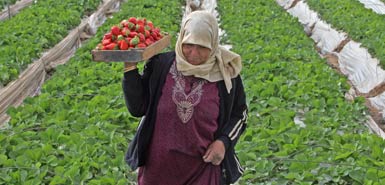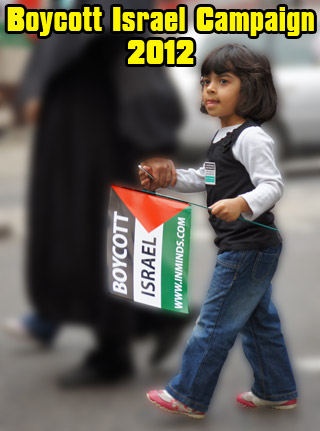
 Innovative Minds © 2014. All Rights Reserved. www.inminds.co.uk | ||||||||||||||
Israel expresses anger at new Palestine food labelsValerie Elliott, The Times Labels will soon show whether food from the West Bank, such as strawberries, dates and olives, comes from Palestinian farms or Israeli settlements, to give buyers a clearer choice.
Figures from Defra showed that for 2006-08 the value of goods imported from the West Bank was £800,000
Supermarkets and other retailers have decided to follow controversial new government guidance, despite Israelâs anger that it will provoke a boycott of its goods. Goods will specify âproduce of the West Bank (Israeli settlement produce)â or âproduce of the West Bank (Palestinian produce)â. The Government has decided that produce from Israeli settlements may not be labelled âproduce of Israelâ because the area is not within the stateâs internationally recognised boundaries. Traders labelling goods from the occupied territories as Israeli produce also face possible enforcement action for breaching EU legislation. The move immediately provoked a diplomatic spat with Yigal Palmor, the Israeli foreign affairs spokesman. He condemned the move, saying that it was âcatering to the demands of those whose ultimate aim is the boycott of Israeli productsâ. He said: âIt is a matter of concern.â  Palestinian fruit: Israel fears that British consumers will boycott its own products His intervention was largely due to the unavailability of comment from staff at the Israeli Embassy in London, which is moving premises. There were also concerns in the wider Jewish community that the British action appeared âovertly politicalâ. It is widely known that the Government believes that the settlement of 500,000 Jews in east Jerusalem and the West Bank is an obstacle to peace. Jon Benjamin, the chief executive of the Board of Deputies of British Jews, which had been lobbying to keep the label âproduce of the West Bankâ, said that there was no demand for new guidelines from consumers or retailers. âThe Governmentâs opposition to boycotts of Israel is inconsistent with these guidelines, which appear to have been published at the behest of the very same groups that promote the wider boycott campaign,â he said. The Foreign and Commonwealth Office and the Department for Environment, Food and Rural Affairs (Defra) denied that they intended to provoke a consumer boycott of Israel or Israeli goods, which they said would do nothing to advance the Middle East peace process. Hilary Benn, the Rural Affairs Secretary, said that the purpose was to give consumers more choice in their purchases and to let them distinguish between goods from Palestinian growers and those from illegal Israeli settlements. He made clear that the guidance was voluntary and that the Government could not compel retailers to adopt the new wording. The British Retail Consortium, which represents leading chain stores, said: âRetailers always make every effort to show the origin of produce clearly â so customers can make their own choices. This is government guidance that has come after long consideration. Retailers will be following it.â The initiative followed a letter to Gordon Brown last year from Oxfam, which raised humanitarian concerns about the impact of the occupied Israeli territories on the Palestinian people. The letter led to a meeting organised by the Cabinet Office in March, attended by the Foreign Office, Defra, Oxfam and retailers, when the labelling issue was discussed. Barbara Stocking, the chief executive at Oxfam, said: âWe support the right of consumers to know the origin of the products they purchase. Trade with Israeli settlements â which are illegal under international law â contributes to their economic viability and serves to legitimise them. âIt is also clear from our development work in West Bank communities that settlements have led to the denial of rights and create poverty for many Palestinians.â Whitehall insiders played down the disagreement and said that the amount of goods imported by Britain from the West Bank was insignificant. Figures from Defra showed that for 2006-08 the value of goods imported from the West Bank was £800,000. Olive oil, aubergines, strawberries, grapes, dates, couscous, olives, almonds, liquorice roots, tomatoes and mixed herbs and seasonings make up the bulk of consignments. Source: http://www.timesonline.co.uk/tol/news/world/middle_east/article6954020.ece Related ArticlesAlso Of InterestPage URL: http://www.inminds.co.uk/article.php?id=10331
|
|
Support Us
If you agree with our work then please support us.Campaigns INMINDS Facebook Live Feed Latest Video's
INMINDS Twitter Feed Tweets by @InmindsComFeatured Video's
You need Flash player 8+ and JavaScript enabled to view this video.
[all videos (over 200)..] Featured MP3 Podcast  "One of the first people we campaigned for [at IHRC] was Mu'allim Ibrahim Al-Zakzaky and 1000 of his supporters which were put in prison. All his comrades were put in prison and then eventually all their wives were put in prison and then all their children were put in prison including a three year old child who was ill in the prison and then what the Nigerian authorities were saying is that they should receive money to feed the prisoners when they have put the whole family and whole community in prison.." Chairman, Islamic Human Rights Commission Islamic Human Rights Commission 10th Anniv. Nov 2007 [7min / 3Mb] [all podcasts..] Newsletter Feedback |
 |
 |


























































